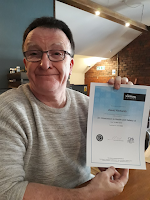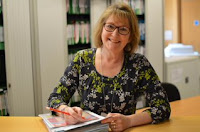PRIME Cymru, are a charity who support the over 50s into employment, self-employment, volunteering and training. It's been a particularly difficult year for older workers following the pandemic, we interviewed Kayleigh from PRIME Cymru to find out more about them the services they offer and the free support available.
 |
| HRH Prince of Wales- Founder of Prime Cymru. |
Can you tell us a little
bit about how Prime Cymru started?
PRIME Cymru was founded
in 2001 by HRH The Prince of Wales, in response to the many letters he was
receiving from those aged over 50, who were facing overwhelming difficulty
securing work because of their age.
What sort of training
and volunteer opportunities are you able to provide?
Our support is always
tailored to the individual client’s needs. For example, some people who come to
us want to upskill to add to their CV and gain a bit of confidence. We can
offer them free training for a First Aid, Food Hygiene, Health & Safety or
COSHH qualification. Plus, we help to look into funding for other specific
career-focused qualifications that can help the client secure work.
Another great way of
boosting people’s confidence in the workplace is to do some volunteering. We
encourage any clients who are feeling tentative because they haven’t worked for
a while - or perhaps have never worked - to do some volunteering. This is a
great way for them to experience work at their own pace.
 |
| Successful client completing Prime Cymru training. |
What inspired your New
Way of Working Certificate and who is eligible to apply for it?
Lots of things changed
during the pandemic – many of us were asked to work from home or conduct
interviews online. We realised that many of our clients were not comfortable
using IT and this was creating an extra barrier to employment. The certificate
covers how to set up for video interviews and tips for working from home, with
practical help with using the technology.
This training is available to any mature individual who is not working and feels like they will benefit from our support.
Are there any barriers
that might prevent people from accessing your support and how do you work to
overcome those?
Since the pandemic, IT
skills have become more vital to engage with every day things like contacting
family or shopping, as well as accessing support like ours. We work with individuals
on a one-to-one basis to help them overcome this barrier. Our New Way of
Working Certificate is a great example of this.
Are there particular
issues which arise in rural areas like Powys for people looking for work? How
can you support people with this?
Transport is a big issue
in rural areas, as well as availability of jobs. We work with clients to
investigate other possible avenues, such as self-employment.
Which areas in Powys do
you offer support to?
Do you work closely with
any other organisations or statutory services to provide support to people?
We often team up with
other organisations for things like careers fairs or webinars. We’ll also
signpost our clients to relevant services to ensure they get all the help they
need.
In your opinion, what
are the possible effects of being unemployed on someone’s mental and physical
wellbeing?
A lot of people we work
with have severely lost confidence in themselves. We work closely with them to
identify their strengths – making them realise their potential!
What is the most
challenging aspect of your work?
Spreading the word about
our free support!
What is the most
rewarding aspect of your work?
Seeing clients go from
lacking in confidence to thriving in their volunteering role, new job or
setting up a business. It’s great to see people start to believe in themselves
again and re-connect with their local community.
 |
| Another Prime Cymru happy client. |
Do you have an example
of a rewarding success story where you’ve helped someone into work?
Nicola Clifford lives in
remote mid Wales, with little internet access. As an aspiring author, she was
struggling to find a publisher online and needed some moral support.
She said: “When you’re 50 and disabled you can feel
invisible, and writing is a very solitary thing. So meeting with PRIME Cymru once
a month for a chat was so important.
“For some people it can take years to be published, so
the encouragement made me keep at it.”
Nicola is now a prize-winning short story writer and a
published author, with four books in her crime series available now with
publishers The Book Folks.
If you could change one
thing about the employment market for over 50s what would it be?
We wish that all
employers could see the huge potential that over 50s workers have to offer.
They’ve got a wealth of skills and experience, that is often underappreciated
in the workplace.
If you had one top tip,
or piece of advice for job seekers over the age of 50 what would it be?
Believe in yourself.
Employers are becoming increasingly more aware of the benefits of mature
workers, so point out your strengths - the skills and experience you have
picked up over the years!
 |



















